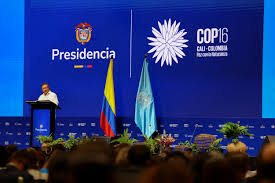November 02, 2024
By Samuel Ogunsona
The most prominent conference on nature conservation, COP16, came to an end on Saturday with “Triumph, Troubles and Unfinished Business”.
The 16th Conference of the Parties (COP16) has come to a close in Cali, Colombia, without achieving some of its intended objectives due to a lack of quorum.
This outcome has reinforced concerns that the current United Nations system is no longer effective in addressing the urgent ecological crisis.
The conference hailed as a critical milestone in the fight against biodiversity loss and climate change, has yielded a decidedly mixed bag of results.
Amidst the fanfare and promises of collective action, the conference’s conclusions have been marked by significant achievements, glaring shortcomings, and also disturbing trends leaving room for questionable decisions.
This dichotomy has led many to describe COP16’s outcome as “the good, the bad, and the ugly”. A nuanced assessment of the event’s successes and failures.
The Good: Indigenous Peoples’ Recognition and Empowerment
One of the significant achievements of COP16 was the recognition of Indigenous Peoples as experts in biodiversity conservation.
Txai Suruí, Coordinator of the Indigenous Youth Movement in her statements said, “The recognition of Indigenous peoples and Afro-descendant communities as biodiversity guardians is historic. We demand accountability from destructive companies and countries to channel resources to these communities. The COP16 deal, though imperfect, offers hope by leveraging the pharmaceutical industry’s revenue to support conservation and local communities.”
Article 8(j) established a new consultative body for Indigenous Peoples and local communities, providing them with a formal platform to advise the Convention on Biological Diversity (CBD) directly.
Oscar Soria, an Argentinian political activist, social journalist, and environmental and human rights campaigner at COMMON Initiative said “The Cali Fund for Digital Sequence Information (DSI) on genetic resources introduces a unique funding mechanism aimed at fairly distributing benefits from DSI.
Funded by contributions from companies from seven economic sectors benefiting directly or indirectly from genetic resources, the fund has proposed a target where half of the resources go directly to Indigenous Peoples and Local Communities (IPLCs), with a focus on supporting capacity-building, biodiversity conservation, and sustainable use.
“However, the structure relies solely on reputational incentives for corporations, offering them the prospect of recognition as contributors without any binding obligations. Participation is voluntary, with companies primarily incentivized by the opportunity to gain reputational prestige on the list of fund contributors.
Speaking on possible challenges, Oscar noted, “While the fund marks an important step toward inclusive benefit-sharing, it may face challenges in securing significant contributions, given its reliance on voluntary goodwill.
“The mechanism’s effectiveness will likely depend on the global community’s willingness to support it and on corporate recognition of the value in participating for reputational gain.” He added.
Speaking, Laura Rico, Avaaz Campaign Director, hailed this development as a “big step forward” for everyone, emphasizing the importance of Indigenous Peoples’ solutions in saving nature._
Laura said, “This new body is the one reason COP16 delegates and civil society shouldn’t walk away with a bitter taste in their mouths. This is a big step forward – for everyone – because Indigenous Peoples are the ones already on the frontlines, with the solutions needed to save nature.”
Also, Martin Harper, CEO Birdlife International said, “Without nature, there are no life saving medicines. But it’s right that those that use or depend on biological resources contribute to conservation.
“The new COP16 deal is less than perfect, but it still sets out how a portion of the pharmaceutical industry’s $1.5 trillion in revenue could help tackle the biodiversity crisis while also directly supporting Indigenous Peoples and local communities.
“Commitments made in Cali are only as strong as the implementation that follows from countries when they leave this venue. Millions of species, including humankind, depend on it.”
This milestone acknowledges the critical role Indigenous Peoples play in preserving biodiversity.
The Bad: Limited Participation and Representation
Despite promises of inclusivity, COP16 fell short in involving civil society actors and Indigenous Peoples in decision-making processes. Many Indigenous voices were ignored in formal negotiations, and translation service lapses further silenced their perspectives. Securing land rights for Indigenous Peoples, a crucial goal, remained unaddressed.
Jiwoh AbdulaiMinister of Environment and Climate Change from Sierra Leone said, *“If you saw your neighbor’s house was on fire, you would not wait until it reached yours to take action. So why is the international community acting with such a lack of urgency when it comes to the global fire we currently face in nature loss?
“Two years ago, we made a commitment to do better and be better. That included wealthier nations promising to deliver at least $20 billion a year in nature finance to the Global South by 2025 to help protect the globally important ecosystems we are trying to protect for all our benefit. With that deadline just weeks away, we are still $4.6 billion short”
Laura Rico, Avaaz Campaign Director, in his observation also noted “This was a People’s COP in name only. If we still want to save our planet, all eyes must now turn towards Brazil’s climate ‘Indigenous COP’. The Brazilian government and its partners need to do all they can to ensure it lives up to its name, and ensure we hear voices from the whole of society.”
The Ugly: Prioritizing Profits Over People and Planet
A significant contingent of countries, primarily from the global North, continued to prioritize profits over people and the planet. This “business as usual” approach was challenged by highly biodiverse nations, the African group, and Small Island States, who emphasized the need for urgent action.
Edda Fernandez, Avaaz Senior Policy Advisor, stressed that the COP’s lack of resolution underscored the need for a more inclusive approach, incorporating the expertise of those best equipped to conserve biodiversity.
Edda Fernandez, Avaaz Senior Policy Advisor and former biodiversity negotiator for Mexico says, “The COP ended with no clear resolution and a sense that this process must no longer be about only biodiversity conservation, it has to be about including the voices of those who know how to conserve biodiversity best, and direct funding for those who are already doing the job on the ground. The obsession with money and profits is overriding diplomacy and cooperation to get us out of the biodiversity and climate crises. In the end, we will all lose because we have run out of time to stop the irreversible change.”
Commenting on the outcome of the event, Jiwoh AbdulaiMinister of Environment and Climate Change from Sierra Leone also stated, “This COP has neither delivered that additional funding nor given us confidence that governments will work together to deliver it in a transparent and urgent manner.
“Biodiversity is a public good; it is our greatest defense against climate change, our source of food, medicine, water, income, and identity. Governments have shown time and time again that they can materialise the fudefense against climate change, our source of food, medicine, water, income, and identity. Governments have shown time and time again that they can materialise the funds needed when they want – be that for pandemics or wars – why then can they not materialise it to fight the greatest existential threat we face?” Jiwoh asked.
A Call to Action
As the international community looks toward to the next COP, there is a renewed sense of urgency to address the biodiversity and climate crises. Jiwoh Abdulai, Minister of Environment and Climate Change from Sierra Leone, emphasized that governments must prioritize funding for nature conservation, acknowledging biodiversity as a public good.
The COP16 outcome serves as a reminder that commitments require implementation.
As Txai Suruí, coordinator of the Indigenous Youth Movement, stated, “Millions of species, including humankind, depend on it.”






